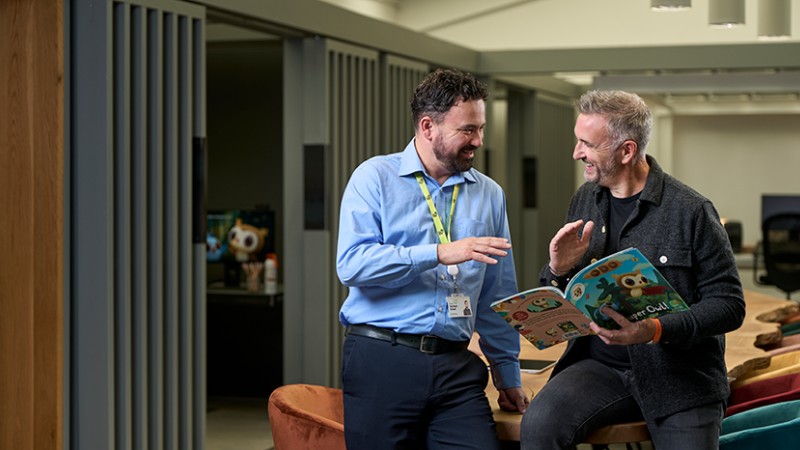Guest article: AI-Driven Enterprises - A practical playbook for Northern Ireland’s next wave of growth

Northern Ireland’s business base is rightly proud of its resilience and ingenuity. The next competitive edge will come from a new kind of firm: the AI-driven enterprise (AIDE). An AIDE is a business that puts artificial intelligence at the core of how it researches markets, designs products, serves customers, and runs operations. Think of it as the innovative ambition of a startup—with the lean efficiency of a well-run small to medium-sized enterprise (SME).
Why does this matter for Northern Ireland? Because AIDEs change the arithmetic of compound growth. They help new companies move from idea to revenue far faster, with far fewer people and less capital. The same is true of existing businesses as they grow beyond serving local markets to export to other regions. That is exactly the formula regions like Northern Ireland can use to compete globally while creating higher-value jobs locally.
What AIDEs mean for Northern Ireland businesses
Most firms here recognise themselves somewhere on the SME-innovation driven entrepreneur (IDE) spectrum. SMEs are close to customers and cash-conscious; IDEs chase global markets with novel tech and often need significant funding. AIDEs blend the best of both: global ambition, but with AI-enabled efficiency. In practice, that looks like:
- Faster product cycles: Generative AI shortens “innovation/product development debt”—the expensive gap between an idea and a market-ready product. Weeks, not years.
- Lean teams, bigger outcomes: AI agents automate routine work in support, marketing, finance, and QA. Revenue per employee rises; hiring focuses on the truly critical roles.
- Earlier revenue, optional capital: When small teams can win paying customers quickly, they can fund growth from sales—or raise less, on better terms.
For founders and leaders, this reframes the core question from “How fast can we hire?” to “How efficiently can we automate and learn?”
Why AIDEs are a regional development opportunity
AIDEs reduce the historic advantages of deep local capital pools and massive headcount. That levels the playing field for places like Northern Ireland, where talent is strong and budgets are disciplined. Three regional dividends stand out:
- Export intensity from day one: AI-enabled go-to-market (multilingual support, automated marketing, programmatic sales) lets small Northern Ireland teams serve customers globally without building large overseas operations first.
- Higher productivity, better wages: As firms replace lower-value tasks with AI, they can upskill and redeploy people into higher-skill roles—improving margins and the quality of local jobs.
- Broader startup base: If it takes less capital to validate ideas, more entrepreneurs can start—diversifying the pipeline instead of waiting for a few big bets.
Where Northern Ireland firms can start—this quarter
1) Run an “AI to revenue” pilot.
Pick one product, service, or process with measurable value. Combine a founder/GM, a technical lead, and an operator. Use generative AI to build or improve the offer; use AI agents to automate lead gen, onboarding, and support. Define a single success metric (e.g., time-to-first-sale, cost per qualified lead, or net revenue per employee).
2) Build an AI operating layer, not just point tools.
Map your end-to-end workflow—from discovery to renewal—and insert AI where it removes bottlenecks (research, prototyping, documentation, testing, quoting, invoicing). Treat this like a lightweight “process transformation,” not a one-off experiment.
3) Hire for leverage.
Prioritise “multipliers”: product thinkers, full-stack builders comfortable with AI, and commercially minded operators who can design data-driven experiments. Make proficiency with AI tools a baseline skill, not a specialist niche.
4) Measure what matters.
Track revenue per employee, time-to-ship, cycle time from customer insight to product change, and the share of tickets/tasks resolved by AI. Celebrate fewer manual steps and faster learning, not larger teams.
AIDEs across Northern Ireland sectors
- Manufacturing & advanced engineering: AI-assisted design, faster quoting, predictive maintenance, and automated quality control—from the shop floor to the sales desk.
- Agri-food: Demand forecasting, yield modelling, automated compliance, and direct-to-consumer personalisation at SME budgets.
- Digital & creative: Rapid prototyping of apps and content, AI-native customer support, and programmatic internationalisation.
- Professional services: Productising expertise with AI copilots, turning billable hours into subscription revenue.
The common thread is clockspeed—how fast customer learning loops through your whole business. AIDEs increase clockspeed dramatically, allowing NI firms to out-iterate larger rivals.
What ecosystem partners can do
- Practical capability building: Short, hands-on sprints that help teams ship an AI-enabled feature or workflow—not just attend a seminar.
- Credits and sandboxes: Low-friction access to cloud/AI platforms so SMEs can test and learn without heavy upfront spend.
- Smart procurement: Public and corporate buyers can pilot local AIDEs, creating the early reference customers that unlock export growth.
- Talent development: Align universities, colleges, and employers around “AI fluency” as a core employability skill across disciplines.
AIDEs are not about replacing people; they are about amplifying the people Northern Ireland already has—accelerating innovation, boosting productivity, and opening global markets from here. If you’re a Northern Ireland business leader, the question is no longer whether to adopt AI at the core of your enterprise, but where to start this quarter. Begin small, learn fast, and let the results compound.
About the Author - Paul Cheek, MIT Senior Lecturer & AI Entrepreneurship Expert
Paul Cheek is a global expert in innovation-driven entrepreneurship, changing the way that businesses start and scale with AI. At MIT, Paul is a Senior Lecturer in the MIT Sloan School of Management and a Senior Advisor for Entrepreneurship & AI at the Martin Trust Center for MIT Entrepreneurship. Paul is a serial tech entrepreneur, educator, software engineer, and bestselling author of Disciplined Entrepreneurship: Startup Tactics. A frequent speaker and consultant on AI-driven enterprises, Paul has taught thousands of entrepreneurs and mentored hundreds of startups across industries and geographies. Prior to his role at MIT, he co-founded three ventures which earned him recognition by Forbes 30 Under 30, the definitive list of young people changing the world. Paul has been featured in publications including Forbes, Bloomberg, Entrepreneur, and Inc Magazine. He serves on the CNBC Disruptor 50 Advisory Board, the MIT Sandbox Funding Board, and judges the U.S. Chamber of Commerce’s CO—100 Awards.




Comments